“If you go to India for a week, you feel you can write a book. If you go to India for a month, you feel you can write a magazine article. If you go to India for a year, you are speechless.” – Dr Ratna Roy
Bulbuls and hoopoes call in the courtyard outside our hotel against a backdrop of beeping auto rickshaws and scooters. We are on our sixth visit to India, a sojourn of friendship, of understanding, of song. What began as a family adventure has become a yearly imperative. We drop everything and leave for six winter weeks to be in the Punjab and Tamil Nadu, to visit the Christian schools, colleges and hospitals – and the dear friends – we have bonded with in our travels.
To say that India has changed our lives would be a supreme understatement. As touring musicians, we have always found that travel is its own spiritual discipline, one in which we feel the Spirit so present – but India … India is a deep plunge. It has been both a wild ride of smells, sounds and sights, yet all the while a journey of slowing down into the graciousness of hospitality and Spirit.
Because I was so clear that God was leading us to India that first year, I was not flustered by our visas not arriving until the last post failed to bring them. Is this spiritual maturity or stupidity?
People as fast-tracked as we were after months of trip preparations needed to be slowed down, I believe, in order to be of any use on our first visit. Our visas – which we had mistakenly indicated as work-related – were “referred to Delhi”. Thus, we were marooned in Vancouver’s Indian consulate indefinitely, our flights lost, time standing still, until we submitted a handwritten promise that we would do “no missionary work at all” in India on this trip.
There are two ways to see an obstacle to travel. One is to wish that the journey would hurry up and begin. The other is to say: THIS is the journey. Whatever is happening now is part of the learning, part of the promise, part of the preparation for what comes next. This kind of waiting is strangely a kind of prayer, really – a time of breathing, hoping, being forthright and aware, respectful and not enraged. It was surely practice for our time in India. Our visas were granted and we were on the plane after three days.
From sunrise to late night, the city streets teem with cars, scooters, bicycle and auto rickshaws, lazing dogs, children walking to or from school in uniform, women in brightly coloured salwar kameeze, handcarts of yarn or vegetables or sugar cane or pipes. Men sit in groups in front of tight-knit shop openings, staring as we pass. Fabrics, dresses, jewellery, potato chips and plastic utensils are all on offer on shop fronts. Alleys open up, like illuminated caves, more dresses, sandals, sweets and fruits geometrically stacked on large plates, incense, strings of marigold…
The traffic in old Ludhiana, where the streets are narrow and winding, is a river. All is reversed. Look right before you cross. Step out in front of traffic; don’t wait for a clear street or you’ll be still standing there until midnight. Drivers veer around the person, animal or vehicle in front of them, sliding midway into oncoming traffic – while the oncoming traffic in turn veers away from them. Pedestrians, including children, move seamlessly to avoid what zooms past them, advancing just enough to beat the onrushing mob. This is all done through the clever use of the horn. Where, in Canada, a honk indicates danger and outrage, here it is part of the give-and-take of road conversation: “I’m right here” or “It’s mine” if you are feeling competitive. Trucks have friendly reminders painted on their back end that say “Blow Horn”, since it is required that vehicles honk as they pass.
All of this seems to me to be part of the system for maximum engagement in India. Crowds are everywhere, with people brushing and bumping up against each other at all times. The people are so numerous and many jobs so low-paying; it occurs to me that one can either guarantee that each and every job pays a minimum wage, or you can scale the wages so that the maximum number of people can be employed. We have made our call in Canada. Here, it seems that many shops have four to six men taking on a variety of roles in the business. Official bureaucracy, which can be such a bane, also might be seen to be part of the Indian way of maintaining maximum contact between people. The concept of a lane of road in which you need not acknowledge the presence of those oncoming may appear to us to be the safest – indeed the only – way to drive, but there is a western sterility to even that.
There are different rules here. And yes, sometimes rule-lessness. We didn’t pull over for the siren-wailing car behind us. Rev. Stanley dismissed it: “That is a private siren. You can buy them.”
David and I, of course, look left when we should look right. We trip on heaves of road, dodge potholes, and – funniest of all – say “Excuse me” when we bump into someone. The picture of Canadians excusing and sorry-ing their way through the roiling streets of India is comic indeed.
It may be impossible to get over the belief that the way you have grown up doing things is THE way – the template from which everything else is an alternative. It is not even a “belief”; it is just – there.
Take, for example, The Toilet.
I ask you, which is cleaner: a couple of handfuls of toilet paper or a sharp spray of water? The spray of water, of course. Still, I am disoriented by a washroom without toilet paper, embarrassed by the obvious practicality of the hose, afraid of being marooned in the cubicle … and even though I acknowledge that it is a cleaner way, I still marvel at the way India has come up with an “alternative” to THE way.
I also notice that not a day goes by that a student does not come to me and ask me to pray for them. They are just beginning a course of education here at the college hospital which will be their journey for life. Many have made a commitment to work in an outlying area for two years as soon as they graduate. Many will emigrate. All of them are on the cusp of something massive in their lives. What they ask me to pray about, however, is that God would direct them to greater faith and give them guidance in how to become better followers of Jesus.
Is it a western thing, or universal, not to notice that one has stopped being a youth? To try to cling to whatever chic, slim, radiant, muscular, sharp, fast, sexy attribute that one can recall ever possessing? I am an elder here. I am twice everybody’s age. I am “Ma’am”, someone to respect and listen to, someone to ask for prayer. At home, I feel the loss of the things of my past, but I can’t quite put my finger on the gains – of these gifts of maturity that are a given here in India.
The electricity has dropped out again, the room swallowed into black. The electronic keyboard ends mid-note, the numerous fans scattered throughout the college chapel lose their motor thrum and slowly drift to silence, my voice becoming a solitary echo in the room. It is the kind of moment I have often feared during musical events. However, these small outages happen regularly, so I have become used to them. I now step away from the keyboard and simply carry on the song without missing a beat, counting on David to drum it along for me, or the group to keep singing. And sometimes I notice, to my surprise, that my own reaction to it all is one of relief: I don’t have to do this the way I always do this. I can find another way to get to my destination with this song. And everybody understands.
The street traffic has taken on a kind of normal to us now, by this sixth year. We have learned to recognize the local vegetables and pulses in the market, so our sense of taste has been enhanced beyond simply the catch-all phrase of “Indian food”. We can read the Indian head wiggle as a variety of Yes-es, and we know that a thing gently said thrice means we should not decline the invitation.
We have noticed change that has rippled out across the country in our years of visits that has taken us by surprise. Is it because India’s population is largely so young that change happens so much faster than in Canada? Dress is more western, “take-away” food outlets have grown in number, young men and women seem less distanced from each other. Chillingly, we hear more strong cautions from our hosts about even appearing to be organizing in Christian gatherings. The present central government has a stated goal of limiting minority populations and faith groups. A pastor from the northern Orissa State tells us that his (Christian) hospital is strictly regulated as to how many foreigners may visit the facility.
“As a result,” he says, “this region is one of the fastest growing Christian populations in the country.” We share his wry observation that “if you want to grow the Christian church, oppress it. If you want to destroy the Church, give it state funding.”
“What story should I tell today?” I ask Serene, who is 11 and the daughter of the pastor, as we make our way to the Rehabilitation Chapel on Sunday morning.
“Maybe the one about the woman who touched just the hem of Jesus’ cloak?” she offers.
Such a story for India: Jesus in a crowd that is pressing in on all sides, a woman who is untouchable, but who dares to reach toward the healer. Jesus says, “Who touched me?” and you can almost hear the disciples laughing: “What do you mean, who touched you? We’re in India, dude; there are a billion and a half people here.”
It is God’s maximum engagement.
Linnea Good and David Jonsson are musical animators – sharing in God’s life-giving work through music and biblical storytelling. This is an amalgam of reflections found in Linnea’s blog. Her website, featuring her music and other resources can be found at www.linneagood.com


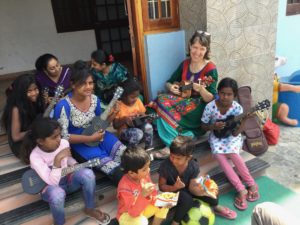
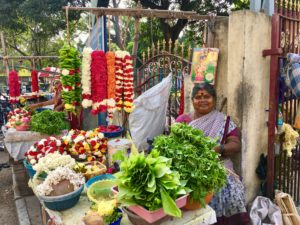
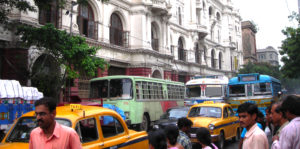
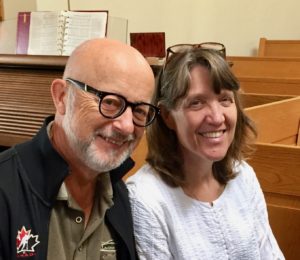
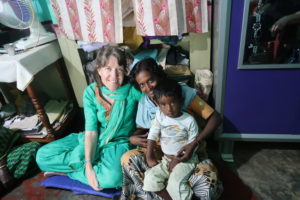
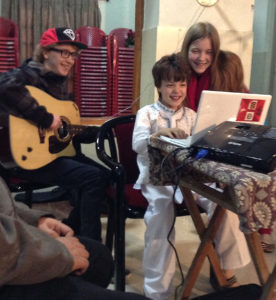
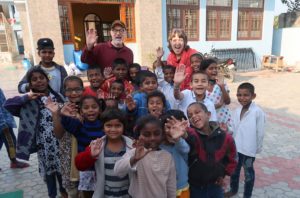






Linnea clearly experiences the mutual benefit of cross-cultural experiences. I’ve enjoyed her songs too!